Cloud storage is great but there are countless situations where it just doesn’t cut the mustard. You need an internet connection for starters and you might not be comfortable storing certain content there where it’s more vunerable. For many users, a portable hard drive or SSD is the perfect storage solution and we’ve tested the best ones you can buy.
There are plenty of portable hard disk drives (HDD) as well as much-faster solid-state drives (SSD) to choose from and we’ve reviewed and ranked some of the best ones. We are focussing on SSDs here but hard drives like the Seagate Ultra Touch get an honourable mention.
Portable USB drives are powered by the connected computer, so you can use them on the move without the need to plug into the mains or use batteries. Some will even connect your phone or tablet and let you extend storage that way, or allow you to transfer or open files.
Find our full chart below and click through to the full reviews if you want to read more about a particular drive. Looking for an internal SATA or NVMe drive? Check out our best SSD chart for something internal, or that you can add to your own casing.
Best portable hard drives & SSDs 2024
1. Crucial X9 Pro – Best Overall
Pros
- Small and robust
- Hardware encryption
- 1-, 2- or 4TB capacities
Cons
- European pricing
- No USB-A cable adapter
- Unavailable software tools
Price When Reviewed:
98,39 € (1 To), 175,19 € (2 To), 316,79 € (4 To)
A new entry at the top is Crucial’s replacement for the drive that previously wore the portable SSD crown. The X9 Pro is even smaller than the X6, has an improved IP55 dust and waterproof rating and comes with a five-year warranty.
It’s extremely fast yet still affordable, although pricing outside of the USA isn’t quite as attractive. It’s still an excellent all-rounder, though, even if Crucial doesn’t supply a USB-A adapter.
If you only have USB 3.2 Gen 2 ports to use with in then this is the drive for you but those with Gen 2×2 should look to the X10 Pro for faster transfer rates, should it be worth the extra money.
Read our full
Crucial X9 Pro review
2. SK Hynix Beetle X31 – Best Runner Up
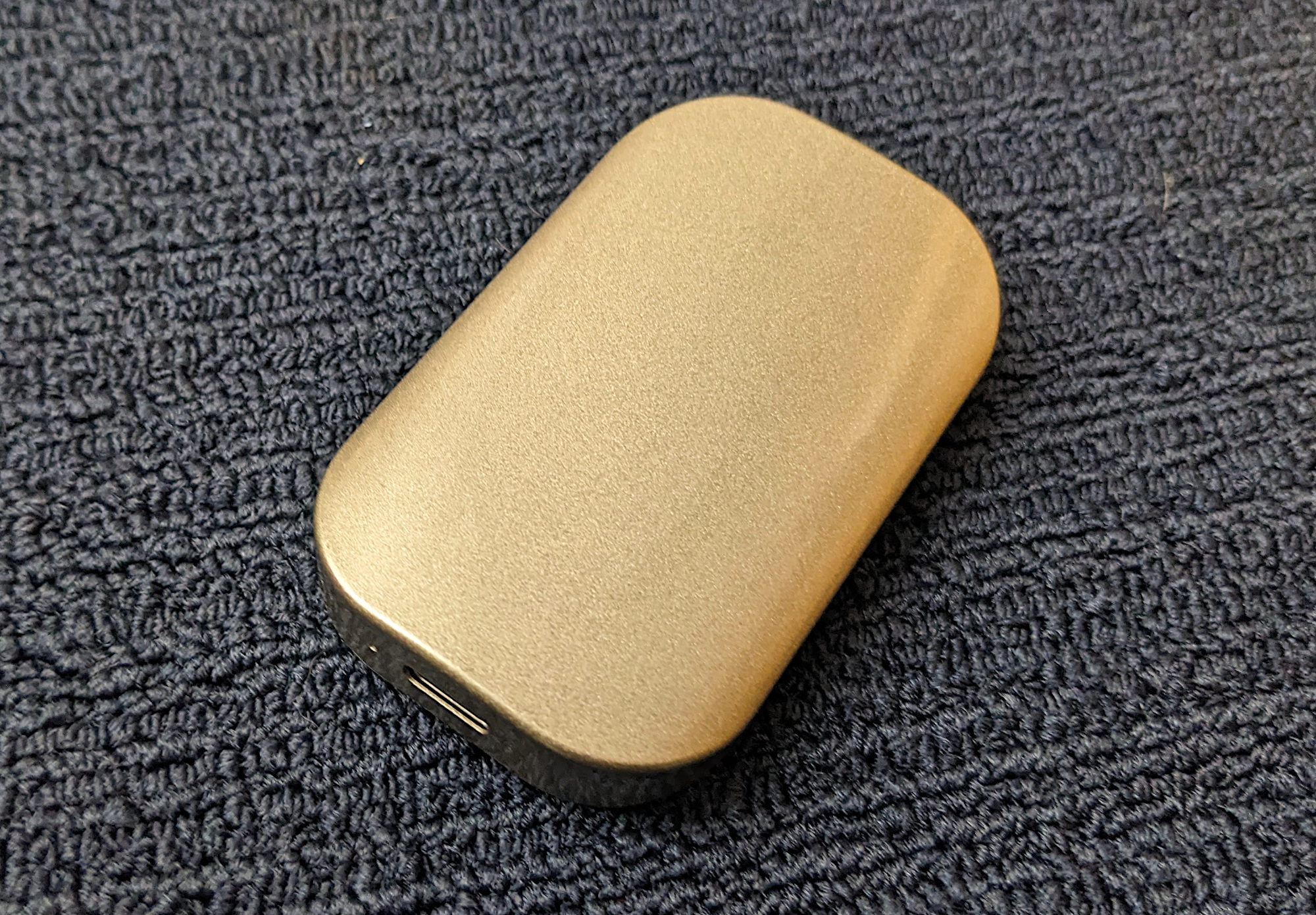
Pros
- Top 10Gbps performer
- Compact, rounded design
Cons
- Available only in pale gold
- Pricier than the competition
If you like to stand out then a golden SSD modelled on a bettle of all things is one way to do it. Just note there are no other colours available so the firm might be losing some customers with this bold choice.
Looking past how much bling it brings to the table, the design is compact and durable, though SK Hynix doesn’t give it an IP rating, it’s drop-proof from two meters and can protect from dust and dirt.
It’s incredibly fast if you have the right ports but the X31 is more expensive than the Crucial X9 Pro and can’t match its 5-year warranty.
Read our full
SK Hynix Beetle X31 review
3. Crucial X6 – Best Value

Pros
- Enhanced performance
- Highly affordable
- Easily transportable
Cons
- Lacks hardware encryption
- No activity light
- 500GB model slower
It might not be quite as fast as the Adata SE760 or its replacement, the X9 Pro, but a recent upgrade to the 1- and 2TB models makes the X6 unbeatable in terms of value for money with the 1TB model costing well under £100/$100.
Furthermore, it comes in an ever more portable form factor than its bigger brother, the Crucial X8, which is still drop tested to 2m and comes with the same three-year warranty.
As an all-rounder goes, it’s our top pick, even if it lacks things like hardware encryption and an activity light.
Read our full
Crucial X6 review
4. Kingston XS2000 – Best 20Gbps SSD

Pros
- Reasonably priced
- Headline performance for Gen 2×2 ports
- Small and lightweight
Cons
- No hardware encryption
- Limited SLC cache size
- No USB Type-A adapter
Price When Reviewed:
Dès 124,96 €
If you want the top performance then the XS2000 is aptly named as it offers headline speeds with read peaking at 2092MB/s, though you will need a USB 3.2 Gen 2×2 port to access this level of performance.
That’s around double many rivals if you do and the price here is surprisingly affordable, plus this is a very portable drive.
On the downside, the limited cache means you won’t get sustained performance for larger files and Kingston doesn’t provide a USB adapter to use the XS2000 with older Type-A ports. You can look to the cheaper Kingston XS1000 if slower speeds are ok.
Read our full
Kingston XS2000 review
5. Crucial X10 Pro- Best 20Gbps Runner Up
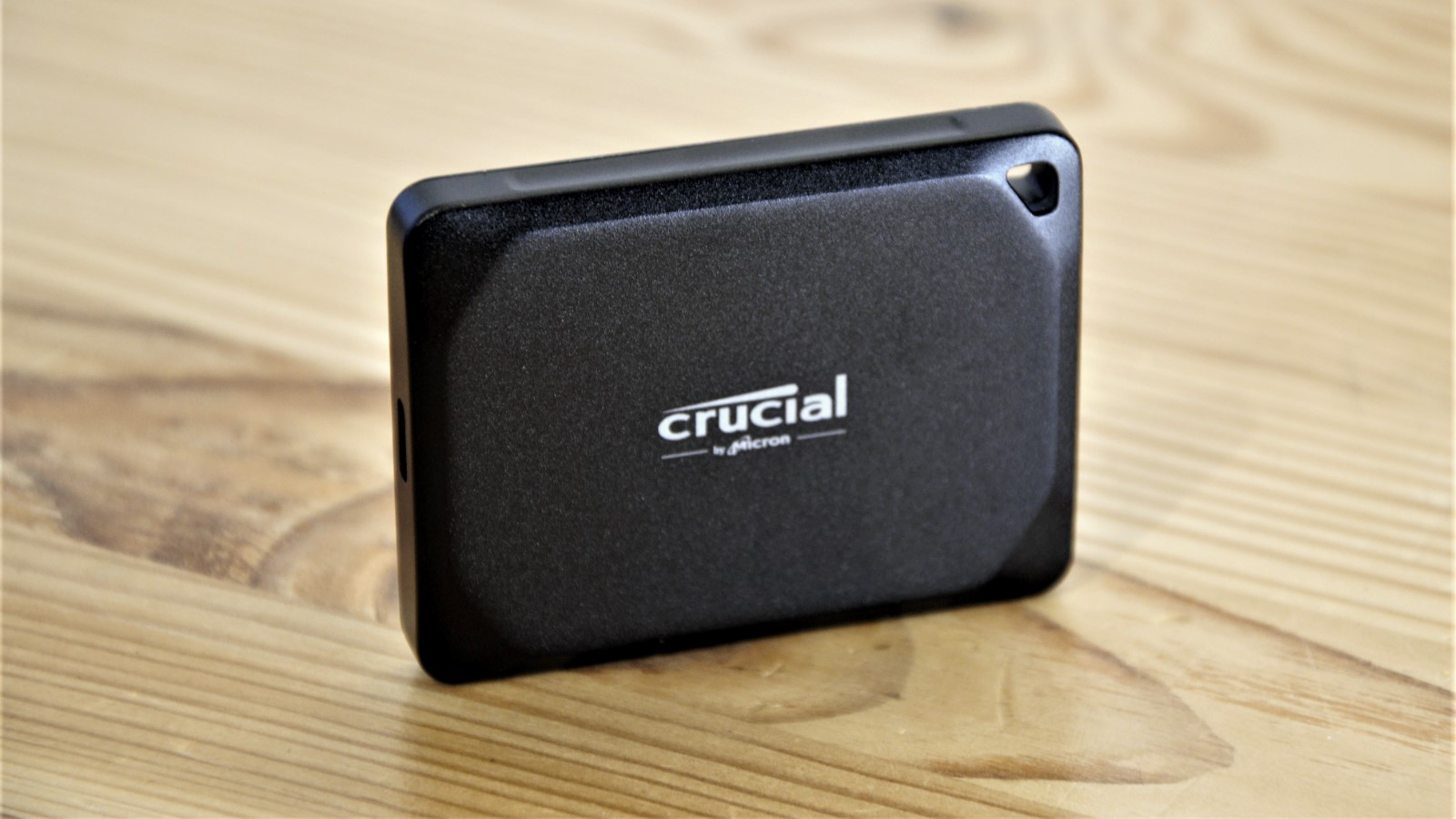
Pros
- 1-, 2- or 4TB capacities
- Hardware encryption
- Small and robust
- Over 2,000MB/s for Gen 2×2 ports
Cons
- Overpriced
- No USB-A adapter
- Unavailable software tools
Price When Reviewed:
141,59 € (1 To), 229,19 € (2 To), 370,79 € (4 To)
Crucial has made another great drive in the X10 Pro but it can’t quite take out the XS2000.
It also goes up to 4TB in capacity, has an IP55 protection rating and a 5-year warranty. However, it does this at a higher price and without including useful items like a USB-A adapter.
It’s another drive that requires USB 3.2 Gen 2×2 ports to make the most of its peak performance so bare this in mind. One reason to buy it over the XS2000 is the inclusion of hardware encryption.
Read our full
Crucial X10 Pro review
6. LaCie Rugged Mini SSD – Best Loud Design
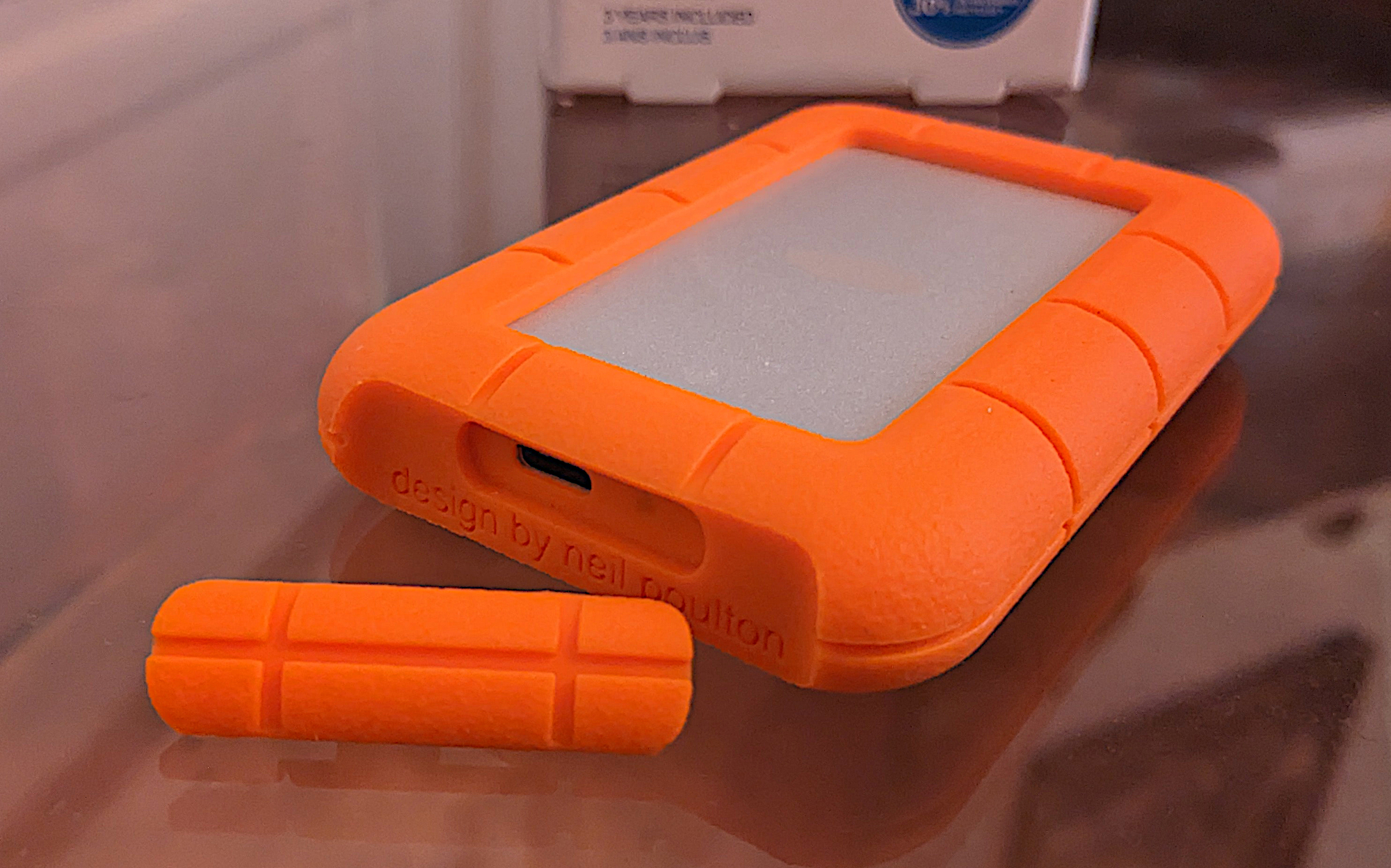
Pros
- Fits in a shirt pocket
- Fast 20Gbps USB performance
- Good looking
- Shock-reducing silicone jacket
Cons
- USB cover isn’t captive
- Not the cheapest
If you want to stand out, or simply help avoid losing it, then a Neil Poulton-designed shock-absorbing sleeve in bright orange gets the LaCie Rugged Mini SSD off to a good start.
The drive is loud and proud and, although it doesn’t have a proper waterproof rating, the drive should withstand bumps and scrapes very well. We just which the port cover was attached to avoid losing it.
Elsewhere, as the name suggests, the drive is compact and highly portable and it’s no slouch either with up to 20Gbps speeds. It’s just not the most affordable option with that figure.
There’s also useful software for backup and security and, along with a three-year warranty, LaCie offers a free recovery service should you need it (heaven forbid!).
7. Adata SE760 – Best Value Performance

Pros
- Cheap
- Great performance
- Type-A & Type-C cables
Cons
- No encryption
- Limited to 1TB
Price When Reviewed:
Dès 51,28 €
Adata has come up with an excellent rival to the Crucial X8 and importantly done so at a cheaper price.
Like the X8 there are no features like a rugged design or encryption but there are alternative options if you need those things.
Instead, the SE760 provides a hassle-free way of carrying around a large amount of speedy storage without breaking the bank. It even comes with Type-C and Type-A USB cables included.
A solid choice if you want between 250GB and 1TB of capacity.
Read our full
Adata SE760 review
8. Samsung T7 Touch – Best Encryption

Pros
- Excellent speeds
- Fingerprint scanner
- Compact
Price When Reviewed:
Dès 119,90 €
Samsung has improved on the popular T5 with a portable SSD that’s both faster and is more secure.
The fingerprint scanner works well but the drive is lacking in a simple way to reset it should you not have the registered finger so just be careful. You’ll also need to be using the right port to get the most out of the T7’s potential speed.
Those are just caveats for an excellent drive which has a lot to like. If you won’t make use of these new features then you may as well grab the cheaper
T5.
Read our full
Samsung T7 Touch review
9. Seagate Ultra Touch (2023) – Best Portable Hard Drive
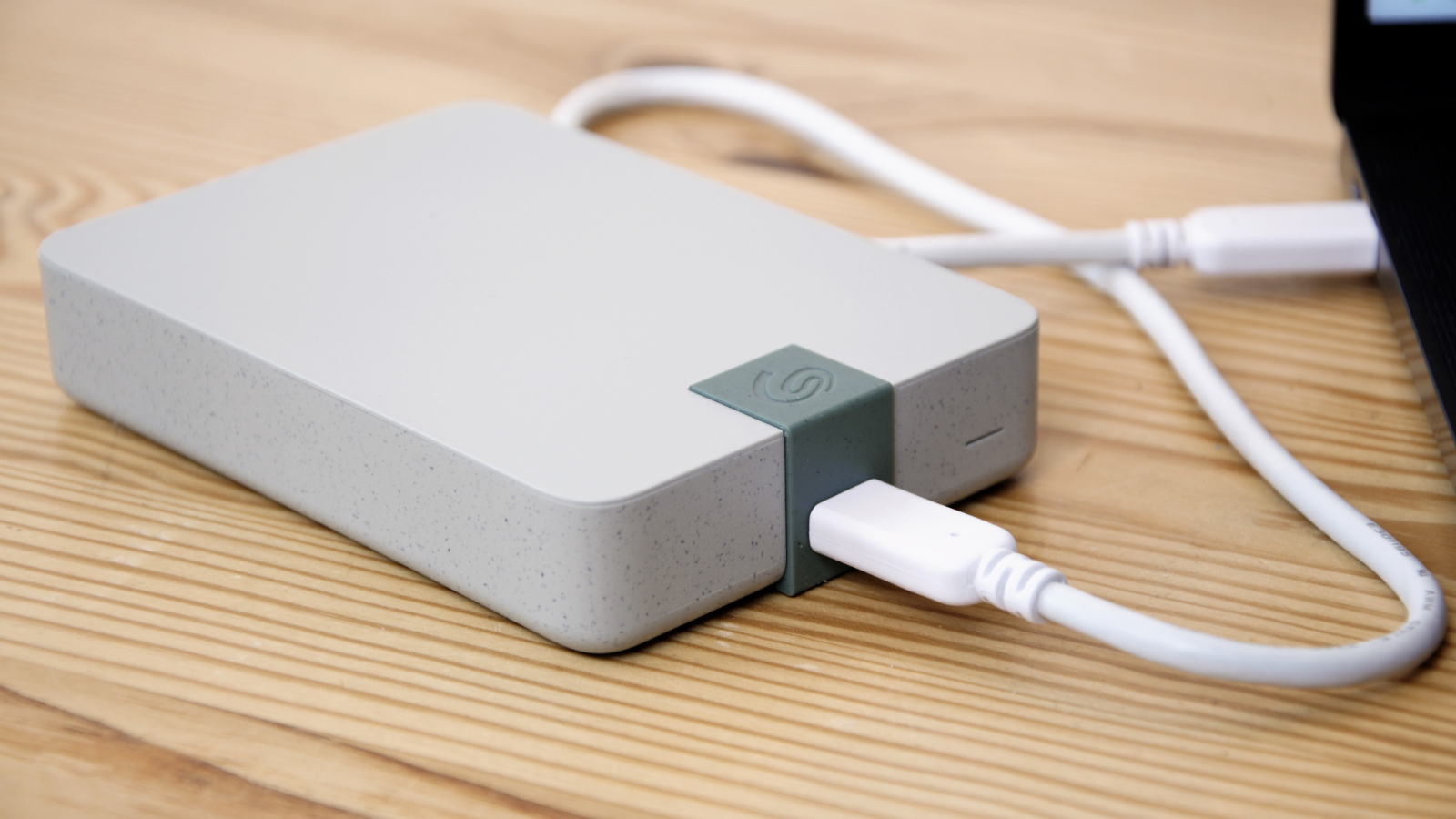
Pros
- Up to 5TB capacity
- 30% recycled (by mass)
- Live backup with Seagate Toolkit
Cons
- Performance is HDD level
- No support for USB-A, only USB-C
Price When Reviewed:
Dès 120,77 €
If you need capacity over speed without breaking the bank and you like to do your bit to help save the planet then the Seagate Ultra Touch is the perfect drive for you.
This is not an SSD so it’s limited to older hard drive speeds but for some people that may not be a problem, especially when the smallest 2TB capacity starts at under $100/£100 RRP.
The simple design with a speckled finish is a hint that recycled material is used – 30% by weight which is more than most portable drives. We also love the included backup software, even though a cable other than USB-C to USB-C in the box would be useful.
Read our full
Seagate Ultra Touch (2023) review
10. SanDisk Professional PRO-G40 – Best Peak Performance
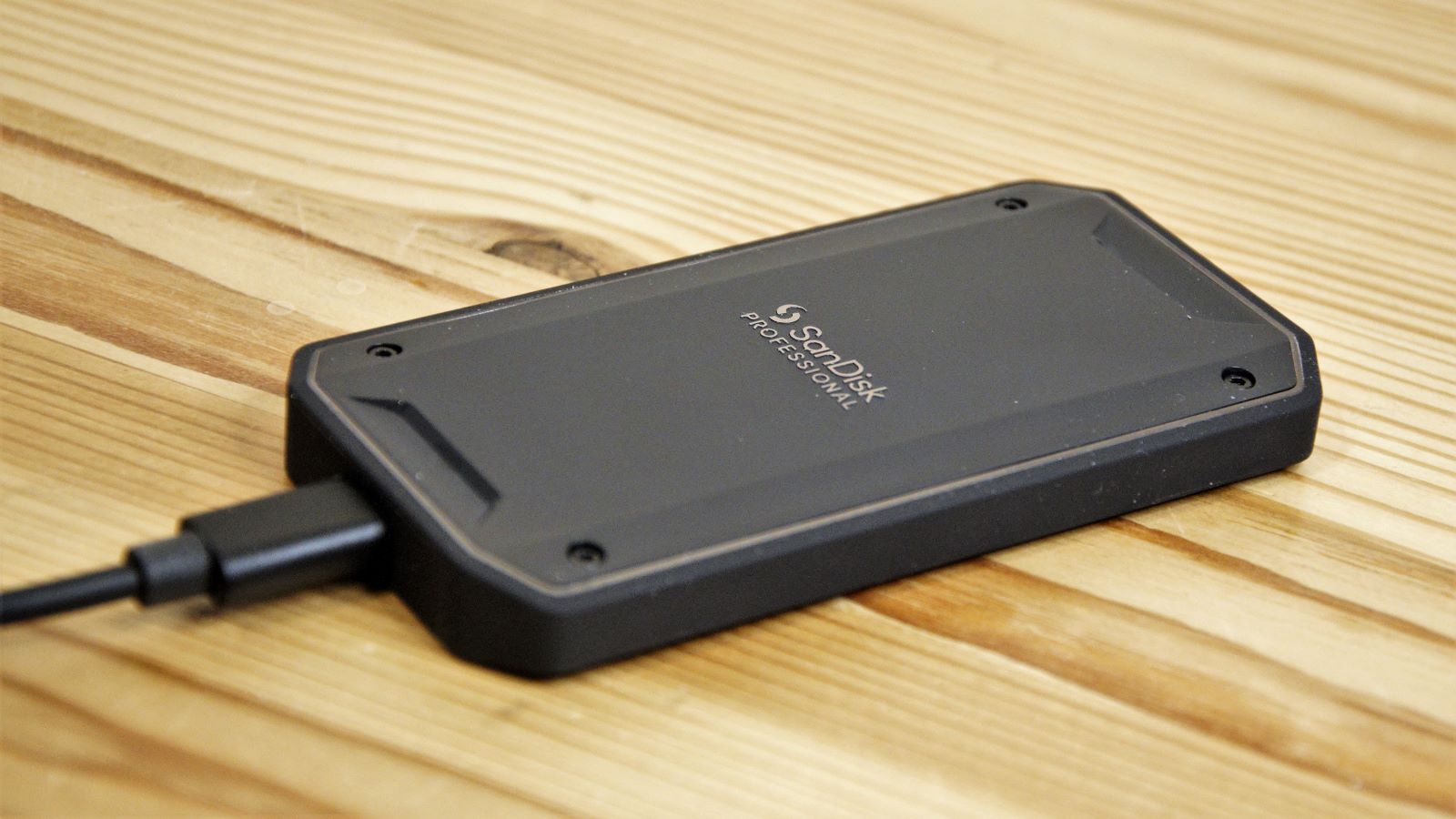
Pros
- Headline performance on Thunderbolt
- USB connectable
- Ultra-resilient design
Cons
- Expensive
- Limited capacities
- No USB Type-A adapter included
Those looking for serious speeds in an ultra-rugged casing that will survive the likes of water, drops and more have just found it.
The PRO-G40 gets close to 3000MB/s in read speeds if you use it over Thunderbolt. With USB 3.2 Gen 2 speeds significantly slower, it’s not worth the high cost of this drive compared to rivals.
That’s the main issue here, with seemingly most of the cost going on the casing, while the drive inside only comes in 1- or 2TB sizes at launch. At this price, a longer cable and some kind of carry pouch would be nice. The G40 will be a better buy once it starts getting discounted.
Read our full
SanDisk Professional PRO-G40 review
How to choose a portable SSD
Even the smallest portable drives are likely to be 128GB in size, which is enough to space thousands of CD albums in lossless FLAC format, or even more in lower quality MP3 or AAC formats. Off-loading your music collection alone from a computer to a portable drive can be a godsend in freeing valuable space if your laptop has limited storage.
Another popular application of portable storage is for keeping critical backups of your data held on a PC or laptop. You may be able to keep a perfect clone of your entire computer’s internal drive, on standby and ready in the event that the computer is lost or its drive should malfunction.
Alternatively, you may choose just to back up the most important files and documents from your user libraries, such as text documents, photos, films, music and stored email. Some portable drives include software that can help automate this process, keeping your selected directories in sync whenever you plug in the drive or by a daily schedule.
Performance
Now that USB 2.0 has been banished from all self-respecting storage, we find USB 3 as the standard for connection, letting these portable drives perform as quickly as the little disks inside will allow.

USB 3 is confusing, as USB 3.0 was retrospectively renamed to USB 3.1 Gen 1. There’s also a newer version, USB 3.1 Gen 2. This doubles the potential throughput from Gen 1’s 5Gb/s to 10Gb/s. In megabytes per second, these equate to 625 and 1,250 respectively. Pretty fast, then.
In reality, most SSDs top out at around 1000MB/s (although you can get faster), and this speed is highly dependent on the device you’re connecting it to so don’t automatically blame the drive if you experience slower speeds. Note that USB-C Gen 2 won’t go any faster when USB 4.0 arrives.
Check out the average speeds in the summaries above, and go to the full review for more detailed benchmark results.
Protection
A rugged exterior will be handy if you want the freedom of being able to throw around the unplugged drive with less worry that it will damage the unit, and more importantly, lose your data.
Look out for shock-resistance ratings such as the US military MIL-STD-810F 516.5 (Transit Drop Test). This means that it should withstand being dropped 26 times onto a hard floor, once on to each face, edge and corner, from a height of 1.22m.

Flash storage – more commonly known as SSDs – can survive more brutal treatment, and some portable drives are even water-resistant. If you were to accidentally drop a portable SSD drive in water, then as long as the port covers are firmly closed, it will work fine to use it after it has been fully dried.
Some drives have an IP waterproof rating like phones.
Reliability
It’s tough to say definitively which manufacturer makes the most reliable hard drives. While there’s a big difference between the technology used in traditional hard drives and SSDs, both have a limited lifespan, and this is why warranties are relatively short – typically two or three years.
What’s important is that you have a well-thought-out backup process and you don’t rely on any single drive to store precious files. Ideally, you should have three copies: one on a PC, phone or tablet, one on a backup drive and one in the cloud.
Value
For many users, a portable storage drive may be an unavoidable commodity, and price will be the deciding factor.
Often an older drive will be cheaper thanks to a drop in price so you might get a bargain, but make sure you’re not missing out on new tech you’d benefit from.
Professionals will be willing to pay more for the faster and tougher SSDs out there.
Security
The larger the drive, the more you can store – and the more you stand to lose in the event of losing the drive or having it stolen. This is where it pays to lock down that drive.
There are two ways to ensure the data is unreadable by other users. You can scramble the contents through hardware encryption. Or you can use a software application to encrypt either parts or all of the drive.





